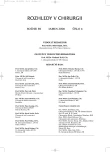-
Medical journals
- Career
A Prospective Clinical Feasibility Study for Multimodal „Fast Track” Rehabilitation in Elective Pancreatic Cancer Surgery
Authors: M. W. Wichmann; M. Roth; Jauch K.-W.; Ch. J. Bruns
Authors‘ workplace: Chairman Prof. Dr. K. -W. Jauch ; Department of Surgery Ludwig-Maximilians University, Klinikum Grosshadern, Munich, Germany
Published in: Rozhl. Chir., 2006, roč. 85, č. 4, s. 169-175.
Category: Monothematic special - Original
Overview
Introduction:
Surgery on the pancreas is a major abdominal procedure leading to a number of pathophysiological alterations during the early post-operative period. Novel approaches to perioperative care including shortened pre-operative starving periods, pre-operative glucose load, sophisticated pain management and early enteral feeding have resulted in major improvements of surgical results after major colorectal surgery. These alterations of perioperative care have been introduced to visceral surgery as so-called fast track surgery or multimodal rehabilitation (multimodal rehabilitation, ERAS = enhanced recovery after surgery). So far it is not known whether or not these approaches can also be applied in pancreatic cancer surgery.Methods:
Twelve patients underwent fast track rehabilitation after pancreatic cancer surgery and their clinical course was compared with age-, sex-, and disease-matched control patients. In addition to clinical parameters (resumption of gastrointestinal function, complication rates, postoperative length of stay) we compared leukocyte counts and C-reactive protein serum levels of both patient groups. Patients recruited for this prospective study received clear carbohydrate rich fluid until two hours before surgery. Bowel preparation was reduced to one-time administration of a laxative and pain treatment consisted of thoracic epidural analgesia in combination with COX-II inhibitors. Intraoperative fluid administration was restricted to 500 cc of colloids and 500 cc of electrolytes. Oral food intake started on the day of surgery with clear fluids and was increased to a small amount of solid food on day 3 after surgery. Complete enteral nutrition was initiated on day 5 after surgery following opaque media examination of the upper gastrointestinal tract. Demission from hospital was planned on day 10 after surgery.Results:
The clinical course of patients undergoing fast track rehabilitation was significantly faster regarding resumption of bowel function and complete enteral nutrition. Furthermore, postoperative length of hospital stay was significantly shorter in fast track patients.Conclusion:
While routine laboratory parameters showed similar changes during the postoperative course after pancreatic surgery, the clinical outcome parameters clearly indicated that the concept of fast track rehabilitation can be even beneficially applied to these high-risk patients undergoing elective surgery for pancreatic cancer.Key words:
pancreatic cancer – Fast Track rehabilitation – elective surgery – clinical outcome
Labels
Surgery Orthopaedics Trauma surgery
Article was published inPerspectives in Surgery

2006 Issue 4-
All articles in this issue
- Re-laparotomy for Complications of Urgent Abdominal Disorders
- Paliative Managment of Oesophageal Carcinomas – Our Experience
- Rare Cases of Acute Urineous Peritonitis as a Consequence of a Spontaneous Rupture of the Urinary Bladder
- Diagnosis and Treatment of Liver Injuries
- Prognostic Factors of Early Recurrence of Colorectal Liver Metastases and Their Usage in Clinical Praxis
- A Prospective Clinical Feasibility Study for Multimodal „Fast Track” Rehabilitation in Elective Pancreatic Cancer Surgery
- The Prepancreatic Course of Superior Mesenteric Vein – a Case Report
- Perspectives in Surgery
- Journal archive
- Current issue
- Online only
- About the journal
Most read in this issue- Re-laparotomy for Complications of Urgent Abdominal Disorders
- Rare Cases of Acute Urineous Peritonitis as a Consequence of a Spontaneous Rupture of the Urinary Bladder
- Paliative Managment of Oesophageal Carcinomas – Our Experience
- A Prospective Clinical Feasibility Study for Multimodal „Fast Track” Rehabilitation in Elective Pancreatic Cancer Surgery
Login#ADS_BOTTOM_SCRIPTS#Forgotten passwordEnter the email address that you registered with. We will send you instructions on how to set a new password.
- Career

